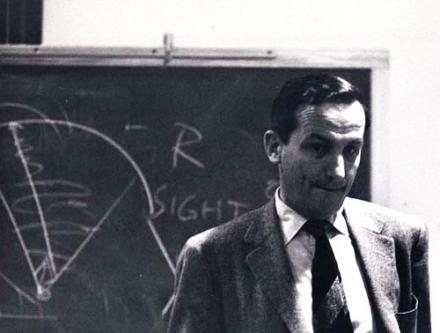"All perceiving is also thinking, all reasoning is also intuition, all observation is also invention."
-Rudolf Arnheim, Art and Visual Perception: The New Version, p.5.
 Rudolph Arnheim
Rudolph Arnheim
Obituary: Rudolf Arnheim
Rudolf Arnheim, a pathbreaking psychologist of visual experience in
the arts, died at the age of 102 in Ann Arbor, Michigan on June 9
2007.
His last academic post was at the University of Michigan, where he was
Visiting Professor in the Departments of Art, History of Art, and Psychology from 1974 to 1984. The previous American years of
his long academic career were spent at Sarah Lawrence College from
1943 to 1968 and at Harvard in the Department of Visual and
Enviromental Studies from 1968 to 1974.
Born in Berlin in 1904, where his father was a manufacturer of pianos,
Rudof Arnheim took his doctorate at the University of Berlin in 1928,
with a dissertation of the experimental psychology of visual
expression, and secundary studies in musicology and history of art.
At the time Arnheim was enrolled in Berlin University's Institute of
Psychology, it was the center of experimentation in Gestalt
Psychology, with Max Wetheimer, Wolfgang Köhler, and Kurt Lewin the
central authorities.
Arnheim conducted some of the earliest experiments in the application
of Gestalt theory in the perception of a work of art. Between 1928 and
his departure from Nazi Germany in 1933, he was on the editorial staff
of Die Weltbühne, the influential weekly magazine then edited by Carl
von Ossietzky and suppressed with the advent of the Third Reich. It
was in this publication that Arnheim ventured into film criticism, a
medium that became central to his theories of vision. Between 1933 and
1938, Arnheim worked in Rome as an editor at the League of Nations'
International Institute for Educational Film. With the declaration of
the "racial laws" in Fascist Italy in 1938, Rudolf Arnheim went to
England, with the assistance of Herbert Read, where he worked as a
translator at the Overseas Office of the BBC in London. Along his
paths he termed "rises and descents, twists and vistas", he migrated
to the United States in 1940. Assisted by a Rockefeller Foundation
Grant, by 1941 he was associated with the Office of Radio Research at Columbia University and from 1942 to 1943 held a Guggenheim Fellowship in New York. The latter year also marked his entrance into academe. While on the faculty of Sarah Lawrence he also taught at the New School for Social Research and from 1959 to 1960 held a Fulbright Lectureship at Ochanomizu University in Tokyo.
Numerous schools awarded honorary degrees to Rudolf Arnheim, including Sarah Lawrence, the University of Michigan, the Rhode Island School of Design, and the University of Padua in Italy. Recently his doctoral degree from Berlin, annulled during the Third Reich, was restored to him by Humboldt University, Berlin, soon to be followed by the
creation of the Arnheim Guest Professorship for Contemporary Art
History. Chairs in his name have also been established at Harvard
University and the University of Michigan. The University of
Bielefeld, Germany, established the Rudolf Arnheim Institute for
International Art, Music and Cultural Economics in 2001.
Arnheim's books on the psychology of vision include "Art and Visual
Perception" (1954, revised 1974), "Toward a Psychology of Art" (1966),
"Visual Thinking" (1969", and "The Power of the Center" (1983). His
influential writings on cinema appeared in 1932 and in a reissue as
"Film as Art" (1957). His most recent books are "Parables of
Sunlight, Observations on Psychology, the Arts, and the Rest" (1989).,
"To the Rescue of Art" (1992), and "The Split and the Structure"
(1996).
Rudolf Arnheim served terms as president of the American Society of
Aesthetics and of the Division on Psychology and the Arts of the
American Psychological Association. In 1976 he was elected to the
American Academy of Arts and Sciences, and in 1978 he was a Resident
Scholar at the American Academy in Rome.
The architectural historian James Ackerman, a colleague at Harvard,
wrote: "From the perspective of the 1990s, Rudi Arnheim emerges as the
quintessential voice of modernism in the sphere of psychology – a
discipline virtually coeval with the modern movement. He clarified to
tens of thousands readers and students the relevance of perceptual
processes to their responses to the arts and especially to the
abstract aspects of art…..On his retirement it proved impossible to
identify a successor of his stature and scope."
Rudolf Arnheim's wife, Mary Elizabeth, died in Ann Arbor in 1999. He
is survived by his daughter Margaret and her husband Cor Nettinga and
their children Kees, Naomi, son-in-law Gerard Castelein, and
great-grand-daughter Ella, all of whom reside in the Netherlands.
A memorial meeting will be held at a later date; for details, please
contact Prof. Arnheim's daughter Margaret (c.nettinga@tip.nl).
+++++++++
This obituary of Rudi written by Marvin Eisenberg provided by his daughter Margaret Nettinga
for more info on him see: http://www.bobolinkbooks.com/Arnheim/Biography.html